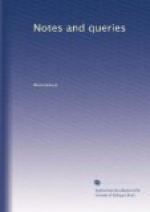Tandem D.O.M.—In an ancient mansion, which stands secluded in the distant recesses of Cornwall, there reposes a library nearly as ancient as the edifice itself, in the long gallery of which it has been almost the sole furniture for a space of full two centuries. What is still remarkable, the collection remains sole and entire in all its pristine originality, as well as simple but substantial bindings, uncontaminated by any additions of more modern literature, dressed up in gayer suits of calfskin or morocco. It is even said that few of the pages of these venerable volumes have even seen the light since the day they were deposited there by their first most careful owner, till the present proprietor took the liberty of giving them a dusting. How far he has advanced in examining their contents is uncertain; but, as he seldom can summon courage to withdraw himself from their company, even for his parliamentary duties, these literary treasures stand a chance, at last, not only of being dusted externally, but of being thoroughly sifted and explored internally. A note of the existence of such a collection of books is at least worth recording as unique of its kind. I have now a query to put in relations to it.
The collector seems to have been one Hannibal Gamon, whose name appears written in fine bold characters,—as beseems so distinguished an appellation,—on the title-page of each volume; but, besides, there is frequently appended this addition—“tandem D.O.M.” The writer has his own solution on the meaning of this bit of Latin, but would be glad to know what interpretation any of your readers would be inclined to put thereon.
FABER MARINUS.
The Episcopal Mitre.—When first was the episcopal mitre used? And what was the origin of its peculiar form?
AN ENQUIRER.
* * * * *
REPLIES.
THE PASSAGE IN TROILUS AND CRESSIDA.
(Vol. ii., p. 386.)
The oldest edition of this play is the quarto of 1609, in which the passage referred to stands thus:—
“Hect. Begon, I say, the gods have heard me sweare.
“Cas. The gods are deafe
to hotte and peevish vowes,
They are polluted offrings
more abhord,
Then spotted livers in the
sacrifice.
“And. O be perswaded, do
not count it holy,
It is the purpose that makes
strong the vow,
But vowes to every purpose
must not hold:
Unarme, sweet Hector.”
This reading, by stopping the sense at “holy,” renders less likely to be correct the emendation of Tyrwhitt, adopted by Malone:—
“O be persuaded: do not count it holy
To hurt by being just: it is as lawful,
For we would give much to use violent thefts,
And rob in the behalf of charity.”
Dr. Johnson observes, “This is so oddly confused in the folio, that I transcribe it as a specimen of incorrectness:—




